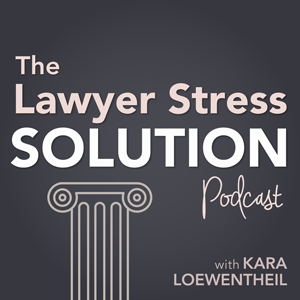
One of the emotions that my coaching clients struggle with the most is guilt. And that guilt is not limited to one area of life. My clients experience guilt about their professional performance, work hours, family obligations, parenting, friendships, and their relationship with themselves, among other things.
On this episode, we’re taking a deep dive into the topic of guilt – what creates it, what to do about it, and what you might want to consider feeling instead. Join me to find out what small change you can make today to counter feelings of guilt, stop being a victim and become a powerful actor in your own life.
If you’re interested going even deeper and would like some help with this work, check out the Clutch.
What You’ll Learn From this Episode:
- What guilt is really all about and why we’re likely to be susceptible to it.
- The importance of understanding that your thoughts don’t hold any moral value.
- Where feelings of guilt come from for most of you.
- How I’ve worked through my personal guilt and sense of family obligations in dealing with holidays.
- The biggest game changer when it comes to dealing with your guilt.
Listen to the Full Episode:
Featured on the Show:
- To work with me check out the Clutch.
Enjoy The Show?
- Don’t miss an episode, subscribe via iTunes, Stitcher or RSS.
- Leave us a review in iTunes.
- Join the conversation by leaving a comment below!






This episode could not have come at a better time for me. Thank you so much for sharing. As an off shoot of this topic, I would love to see a podcast about strategies on how to effectively set boundaries in our relationships (both work and personal). For example, I understand that others actions or opinions have nothing to do with us (i.e. overbearing boss or interfering mother-in-law), and am working on accepting that guilt is only a perception of being morally wrong for not making that person happy or doing what they want me to do, but are there strategies that I could use to set boundaries for myself when dealing with an aggressive, won’t take no for an answer type individual. Is it merely a mental game? I.e. choosing to do what I want to do, pushing back or saying no repeatedly and doing the mental work to stop the guilt and anxiety for not meeting that person’s expectations? Or are there any specific tricks or phrases that are helpful when dealing with these types of relationships? Thank you again for sharing these podcasts! I look forward to seeing the new program!
Hi Emilia! Thanks for your thoughtful comment. I think the answer depends on the context. In some situations, the first step is getting over the guilt, and then the second step is getting over the feeling of obligation to continue interacting and getting comfortable with setting peaceful boundaries. For instance, saying firmly but calmly “This topic of conversation is closed. We can wrap up here or talk about something else.” You aren’t obligated to sit there while someone is really up in your physical space or being emotionally abusive (yelling at you, criticizing you, etc.). There are situations in which you may want to learn to just stay calm and stay put (like with a boss you can’t tell off) and then situations where you may want to learn to feel comfortable and confident ending the interaction and walking away. I’ll definitely do a podcast on boundaries in the next few months, it’s a great question! If you want to check out the info on the new program, since you mention it, you can read all about it at http://www.unfckyourbrain.com/uyb-join !
Hi Emilia! Thanks for your thoughtful comment. I think the answer depends on the context. In some situations, the first step is getting over the guilt, and then the second step is getting over the feeling of obligation to continue interacting and getting comfortable with setting peaceful boundaries. For instance, saying firmly but calmly “This topic of conversation is closed. We can wrap up here or talk about something else.” You aren’t obligated to sit there while someone is really up in your physical space or being emotionally abusive (yelling at you, criticizing you, etc.). There are situations in which you may want to learn to just stay calm and stay put (like with a boss you can’t tell off) and then situations where you may want to learn to feel comfortable and confident ending the interaction and walking away. I’ll definitely do a podcast on boundaries in the next few months, it’s a great question! If you want to check out the info on the new program, since you mention it, you can read all about it at http://www.unfckyourbrain.com/uyb-join !